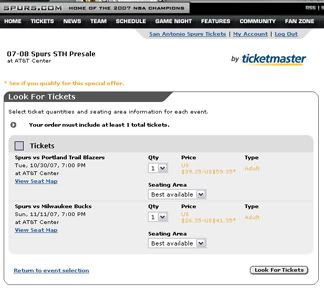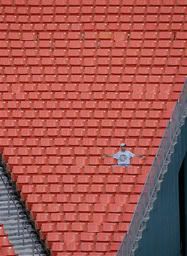
What happens when Greg Oden isn't there to justify the Portland price hike? (Credit: RM)
It’s arguable that NBA fans would pay more to see LeBron James rather than Antoine Walker, but this week has brought a new test to the theory.
For season ticket holders of the San Antonio Spurs, individual game tickets went on sale this week and there was a noticeable bump on the prices of some games. Fans with the option to buy now are reporting the season-opener against Portland, as well as games against conference rival Phoenix and intra-state rivals Dallas and Houston are higher than most other games.
A supposed Spurs season-ticket holder said prices were increasing about 50-100 percent for the aforementioned games. That’s interesting.
A look at the seating chart and pricing (warning: PDF) for the AT&T Center reads "Tiered pricing will be in effect for select games."
I believe people will pay more for better games with arguably better players. The initial reaction around the Spurs message boards when Thursday’s news of the injury to Greg Oden and the ticket pricing was discovered was that the price for the Trail Blazers game might drop. That’s not going to happen considering it’s also expected to be the night when the Spurs receive their championship rings.
But think for a second if the game were scheduled a week later – would the pricing have to drop some with Oden missing the game? The casual NBA fan might not be so apt to shell out a little more money for the game while a deeper fan would recognize the Blazers have a solid, young core of players in Brandon Roy, LaMarcus Aldridge, Sergio Rodriguez and Raef LaFrentz (okay, you can stop laughing at the last one) that should be very entertaining to watch develop into a championship contender once their man in the middle returns.
What happens if Dirk Nowitzki goes down with an injury a month before Spurs vs. Mavs? Do the Spurs drop prices on tickets and risk an iPhone-like backlash or do they run the risk of not selling out the arena for what would still likely be a nationally-televised game?
The Spurs dealt with an embarrassing ticket situation following the Western Conference Semifinals against Phoenix last season. Following the emotional exhaustion of the victory over the Suns, there was such a quick turnaround – late Friday to midday Sunday/Father’s Day – to the matchup against the Utah Jazz in Game 1 of the Western Conference Finals, that the game didn’t come relatively close to a sellout (officially more than 450, but eyewitness accounts bump that number a little higher).
On the flip side, would teams reduce prices for games that might not sell? Doubtful. First, if your team is successful at bringing in fans at your pre-determined price, why drop the price and lose profits? People are already paying the set price and I don’t see a backlash coming unless your team flat out sucks and ownership fails to try and pour money back into the franchise to rebuild (see: Pirates, Pittsburgh; Lions, Detroit).
But as the NBA has seen its marketing go time and again (and as Scooter has pointed out) with the focus on individuals versus teams, the time when ticket prices rise for a game against a great team with less marketable (for whatever reason) stars will not come soon enough.
Granted, this is nothing new and MLB is approaching record attendance numbers (most on the high side and a few on the low side). The other factors will come into play, too, such as overall ticket pricing, local market economy, total costs of attendance, etc.
So the question finally arises: At what price point will you pay to see your favorite team play against a stellar rival versus one against an also-ran? Would you also demand to pay less for the lesser teams?

Joe
E-mail us
Joe is a guest contributor to laissez-faire ball.




